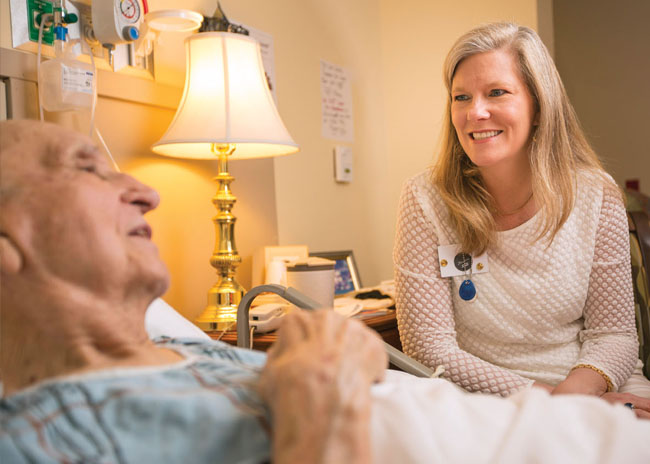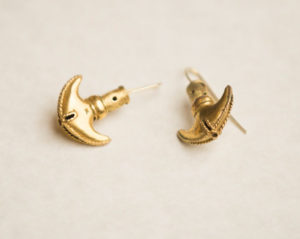
By Tom Wilemon
Frequently busy with meetings, planning sessions and administrative responsibilities, Alive Hospice President and CEO Anna-Gene O’Neal welcomes the chance to slip out of her office and spend time with residents and staff in Alive’s residence near downtown Nashville. On this particular rainy morning, she sits by resident Knox Ownby’s bed and listens as he tells her about his family.
O’Neal, who has BSN, MSN and MBA degrees from Vanderbilt University, oversees care for Alive Hospice’s daily census of 430-plus patients in a 12-county area of Middle Tennessee. She manages an annual budget of more than $29 million, running the nonprofit organization from an office next door to the agency’s Nashville residential unit, where every room has a scenic view with greenery and natural light, and the central courtyard includes a koi pond with foot-long fish.
“We are not about being here for dying patients,” she said. “We are about being here for living persons.”
O’Neal took the helm of Alive Hospice in 2012 after a successful period as an executive with for-profit hospital systems, where she specialized in quality control. The Alive Hospice job gives this Nashville native, who decided to become a nurse in college, a closer connection with patients.
“Nursing has such an intimate relationship with patients,” she said. “You get to spend more time with them. You get to know them better as people — not just by the diseases they have.”
Self-discovery
After obtaining her undergraduate degree in nursing, O’Neal worked as a nurse in Vanderbilt Children’s Hospital’s Neonatal Intensive Care step-down unit, but had not yet decided on a specialty. Her supervisor, Diane Deslauriers, MSN ‘04, suggested a stint in the emergency department.
“You will see everything,” Deslauriers told her. “Then you can pick and choose your greatest interest.”
O’Neal liked that idea. She looked forward to the adrenaline rush of springing into action to save lives and the professional satisfaction of dealing with diverse medical cases.
She discovered that while she could handle most cases coming into the emergency department, she had a different reaction to patients in cardiac distress. Something about the fragility of a human heart sent her into self-doubt.
“I was terrified of taking care of patients in the (ER) cardiac room,” O’Neal said. “I was great with kids. I was great with trauma. I was great with general medical cases. When I was assigned to the cardiac room, I was terrified. Then it hit me. I was terrified because I just didn’t know as much as I should have.”
O’Neal confronted her fear and gained certification in Advanced Cardiac Life Support (ACLS), then furthered her training to become an ACLS instructor. In that first year on the job, she was named 1989 Staff Nurse of the Year at Vanderbilt University Medical Center.
Perspective
She soon moved into leadership positions, first as a project manager and then as department manager. During her second and third years in the department, she became the inaugural student to enroll in Vanderbilt’s joint MSN/MBA program for nurses, working weekends and attending classes on weekdays.
“Attending a full-time graduate program and working full time on the weekends — by the second semester of the first year, it was stressful,” O’Neal said.
She had married Scott O’Neal in 1988 after they had completed their undergraduate degrees at Vanderbilt. He and other family members helped her put her life in perspective. She realized any pressure she felt was only pressure she put on herself. She didn’t have to complete graduate school in two years.

“Sometimes, the stressors we have are self-induced,” O’Neal said. “I ended up finishing the program on time, but I needed to have somebody remind me that it was my personal choice to do this. Nobody was making me do it.”
Beginning in 1996, O’Neal took a four-year break from nursing to be a full-time mother while helping out with her husband’s family-owned floral business. She kept in contact with the nurses she had worked with, including Susan Batt, one of her closest friends. Batt — the nurse who had been with her when she delivered her first child, the running buddy she hung out with on weekends and the woman she swapped stories of motherhood with — was fighting a losing battle with breast cancer. During O’Neal’s last visits with her friend in 2002, she witnessed the work of hospice nurses.
Five years later, Wendy Kanter, another friend, died of breast cancer in a hospice facility. Kanter was the wife of Ken Kanter, the founding rabbi of Congregation Micah, the synagogue O’Neal attends. Wendy Kanter was a massage therapist who had comforted Batt during her illness. O’Neal traveled to Cincinnati, where the Kanters had moved, to be with her before she died.
“I miss them (Batt and Kanter) every day,” O’Neal said. “With those experiences, hospice meant something different to me.”
Lure of Alive
In autumn 2011, a colleague who was on the Alive Hospice Board of Directors asked O’Neal to serve alongside her. She joined the board in December just as it was finishing its search for a chief executive officer. But in January, the chair of the board sent an email stating that the job would not be offered to the round of candidates who had interviewed and that the process would start anew with a national search. O’Neal was having lunch with her husband when she received the email.
“I looked at him and said ‘I want that job,’” she said.
He replied, “Why are you telling me?” and encouraged her to apply.
O’Neal asked to be considered, and resigned from the board. On the 10th anniversary of Susan Batt’s death, dining with Batt’s husband and children, she received a telephone call with the job offer.
“That really felt a little bit more than a coincidence for me,” she said.
O’Neal reported to work wearing gold earrings that had belonged to Wendy Kanter and given to O’Neal by Wendy’s husband. She still wears them.
Patient advocate
Since she took the helm, Alive Hospice has experienced a financial turnaround. Working with her staff — including Deslauriers, her first boss who is once again a colleague — she has reduced expenses, increased cash on hand and overseen a surge in patient census while improving quality, as measured by a Joint Commission review, and employee engagement, according to staff surveys. This August, Alive Hospice broke ground for a second residential facility scheduled to open in 2017 in Murfreesboro, Tennessee.
But the mission of Alive Hospice isn’t measured in buildings or finances, O’Neal said. She recalls how a 13-month-old child came to Alive’s Nashville Residence after having spent her entire life in hospitals. One of the nurses decided the child would never touch a bedsheet again, and nurses took shifts holding the child in their arms for three days until her passing.
“Never be afraid to be a patient advocate,” O’Neal said. “With that, trust your gut. When they are most fragile, patients don’t have the ability to be advocates for themselves. They depend on nurses and other clinical professionals to be able to look beyond and to be their advocate. Never shy from that and never back down if you feel like something is not right.
“You have to do it professionally, and you have to have appropriate communication, but never back down.”